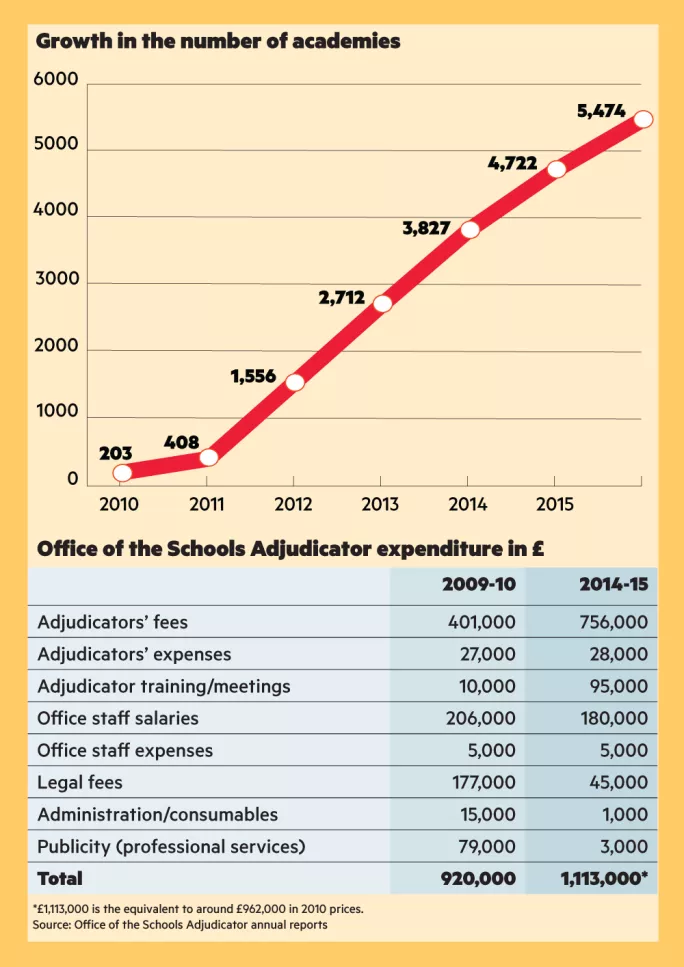Admissions overload risks schools ‘playing the system’

Experts have warned that findings from a TES investigation, suggesting a major lack of resources for the official adjudicators overseeing school admissions, mean that more schools will be able to “play the system” and “get away with it”.
Government figures show that the number of academies - which control their own admissions - rose from 203 in 2010 to 4,722 in 2015, amounting to a 2,226 per cent increase.
Yet TES has established that the amount of public money spent on the Office of the Schools Adjudicator (OSA) - which oversees England’s increasingly complex state school admissions system - has risen by less than 5 per cent in real terms over the same period.
And the money spent on office staff supporting the adjudicators actually fell between 2010 and 2015, despite a corresponding 23-fold rise in the number of academies acting as their own admissions authorities.
The latest OSA report revealed that hundreds more schools were breaking admissions rules.
‘Playing the system’
Alan Parker, a former schools adjudicator, told TES: “The overall result of changes in the system - academisation, increasing pressure to improve results at all costs, less effective controls on admissions - risks the erosion of moral behaviour as more people fall under increasing pressure to play the system and find it easier to get away with.”
He added that major cuts to local authority finances were also “making it difficult for them to [police admissions] proactively”.
“There are some honourable exceptions, but most will find it difficult to do more than respond to complaints that are brought to their attention by others,” he said.
Policing admissions is likely to become even more demanding if the government’s plans for a new wave of grammar schools go ahead. Ministers want new and existing grammars to provide a “proportion” of their places to “low-income households”, a plan likely to result in a controversial new set of school admissions rules to oversee.

Rugby High School, a girls’ grammar in Warwickshire, found itself facing an official parental objection in 2014 after proposing to give admissions priority to those eligible for the pupil premium.
Margaret Tulloch, from the anti-selection campaign group Comprehensive Future, said: “If there is any element of selection being introduced, it will mean more work for the adjudicator. It could increase complaints.”
The former chief schools adjudicator, Elizabeth Passmore raised concerns about the strain on adjudicators’ time and costs caused by a high number of objections from pressure groups last year.
In January, the government responded with plans to ban politically motivated groups from objecting. But the money spent on office staff at the OSA had already dropped by 13 per cent from 2010 to 2015, without inflation being taken into account.
Administrative burden
Critics say that the answer to the ever-increasing workload should be more resources, rather than greater restrictions on the numbers who can object, so that more cases where admissions rules are broken can be challenged.
Mr Parker said the fact that OSA expenditure on office staff had fallen while adudicators’ fees had risen, suggested that more of adjudicators’ time was being spent on admin.
“This indicates that Department for Education cuts have caused some of the burden of administration - sending out routine letters, arranging meetings and so on - being shifted from seconded DfE officials to the independent adjudicators themselves,” he said.
Professor Anne West, a school admissions expert from the London School of Economics said that the lack of resources for the OSA, and for councils, which are also supposed to police admissions, was a “major cause of concern” (see box, below).
The huge rise of schools that serve as their own admission authorities has made local authorities’ role in checking that their arrangements comply with the school admissions code even more challenging.
And the latest OSA report, published in December 2015, found that 1,916 schools in charge of their own admissions - of which 810 were academies - did not send their local authority a full copy of admission arrangements as required. This was an increase of “just over 500” on the previous year, it said.
Earlier this month, the DfE said that an investigation had revealed a “likely” under-reporting of admissions appeals by voluntary-aided, foundation and academy schools.
Academy chain director Dame Sally Coates believes that rising academy numbers mean admissions rules need tightening up.
“Now more schools are becoming academies, [there is] more reason to overhaul it,” Dame Sally, who oversees United Learning’s academies in the South of England, told TES. “I don’t think because they’re cheating on admissions, or some of them may be cheating on admissions, that should say you can’t become an academy. But we just need to take control of admissions.”
An OSA spokesperson said: “The chief schools adjudicator considers that the OSA has always had the administrative staff and capacity necessary to support the work of the adjudicators who deal with the cases referred to us.”
A DfE spokesperson said: “All schools must follow the school admissions code, which ensures school places are allocated fairly. All objections about admission arrangements - regardless of school type - are investigated by the adjudicator.”
You need a Tes subscription to read this article
Subscribe now to read this article and get other subscriber-only content:
- Unlimited access to all Tes magazine content
- Exclusive subscriber-only stories
- Award-winning email newsletters
Already a subscriber? Log in
You need a subscription to read this article
Subscribe now to read this article and get other subscriber-only content, including:
- Unlimited access to all Tes magazine content
- Exclusive subscriber-only stories
- Award-winning email newsletters